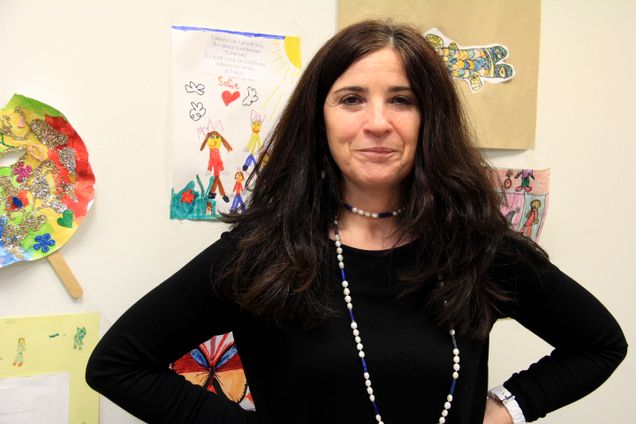FACULTY FEATURE: Lucia Pastorino

Sitting across from us in the comfort of her very practical, but nevertheless, cozy office space, Dr. Lucia Pastorino savors her chicken and rice. “Do you mind if I eat lunch? I haven’t eaten all day,” she asks as she gets out her lunch box. A prominent member of the Undergraduate Neuroscience Department, Dr. Pastorino keeps a tight schedule; nonetheless, she takes the time to share her inspiring story of exploration, discovery, and growth.
Dr. Pastorino was born in the beautiful city of Lecco, Italy, a small industrial town north of Milan. “It’s beautiful because it’s right at the lake and there are mountains,” she reminisces, “it was a city that taught me a lot; it’s a city of hard workers.” The industrial nature of the city produced a population that mostly consisted of business professionals and entrepreneurs; however, that was not her calling. “I really didn’t want to be in business. I wanted to be in the science field, so I chose [to pursue a] B.S./M.S. for my undergraduate studies.”
Dr. Pastorino’s undergraduate years were spent at the University of Milan studying Medicinal and Pharmaceutical Chemistry, which she loved because of its interdisciplinary applications to studies of medicine. “I wanted to see things from all different angles,” she explains, “with Medicinal Chemistry, you have chemistry, physiology, anatomy, biology, and biochemistry… you get to bring everything into the lab in one experience.” When she started her thesis, Dr. Pastorino was working in a Neuropharmacology lab that conducted studies on Alzheimer’s Disease, which then became the basis of her career as a researcher studying how modifications in the protein APP affect the progression of Alzheimer’s Disease. In 1996, she published her first paper with this lab, exploring the functions of beta-secretase at the genetic level. After graduation, she completed a fellowship in Geneva and eventually earned a Ph.D. in Neuropharmacology at her alma mater.
Dr. Pastorino first arrived in the United States on October 2nd, 1999 for her postdoctoral fellowship at Mount Sinai School of Medicine in New York City. “I remember landing at JFK and thinking, ‘what a beautiful skyline,’” she recalls, “I couldn’t wait to get out of the airplane. I loved it.” She also recalls her living space, which was “altogether, as big as [her office].” In spite of her cramped apartment – which also came with mice and roaches – Dr. Pastorino claims that her three years at Mount Sinai were the best years of her life. What she loved most about New York was that “[she] was nobody, with the happiness to be nobody,” which gave her the freedom to be independent and pursue her own adventures. She proceeded to publish another paper in 2002 concerning the intracellular transportation of beta-secretase, which contributes to the accumulation of Amyloid-beta plaques in the brains of Alzheimer’s patients.
At Mount Sinai, Dr. Pastorino met her future husband while taking English classes at a different institution. Shortly after they met, her then-boyfriend moved to Boston, and a year and a half later, she followed. In 2003, Dr. Pastorino worked as a researcher and instructor of Medicine at the Beth Israel Deaconess Medical Center. Three years later, she became an instructor at the Harvard University Extension School. There, she pursued her passion for teaching. “I love it,” she tells us, “I love telling you what this is all about. I get too excited!” In 2013, Dr. Pastorino became a lecturer of Neuroscience at Boston University. When we asked what attracted her the most to the university, she responds, “BU [has] a very cooperative and diverse community of scientists that [really enriches my teaching experience]. I wouldn’t be able to do the same somewhere else.” The neuroscience department at BU, which is ranked number 41 globally by US News, has a special place in her heart. “You guys, your motivation, your interest, your excitement – you’re challenging sometimes,” she explains, “we always hope to challenge you in a good way, knowing we will be challenged back. This is what makes all of us better, it keeps us growing.” Dr. Pastorino’s goal as an educator is to make sure that her students don’t fear the subjects she teaches and to make her classes as enjoyable as she can. She credits her department for giving her the freedom and flexibility to achieve her goals, and applauds “[the department’s] ability to be appreciative of all [their] resources and to push [themselves] to do something new.”
Dr. Pastorino currently teaches four classes at Boston University: Introduction to Cellular and Molecular Biology (NE102), Biology of Neurodegenerative Diseases (NE525), Translational Research in Alzheimer’s Disease (NE535), and the Pre-lab portion of Organic Chemistry I with Integrated Science Experience Lab (ISE II). You can find out more about these classes on the BU course catalog.
Writer: Stephanie Gonzalez
Editors: Enzo Plaitano, Yasmine Sami, and Yoana Grigorova